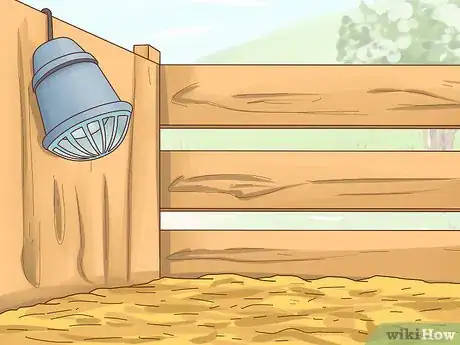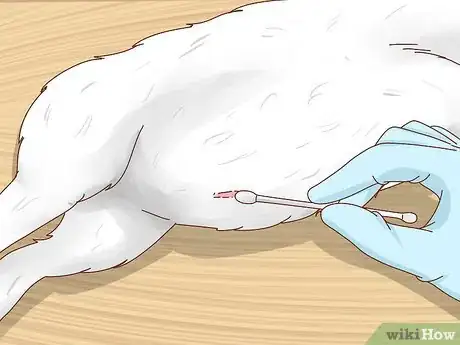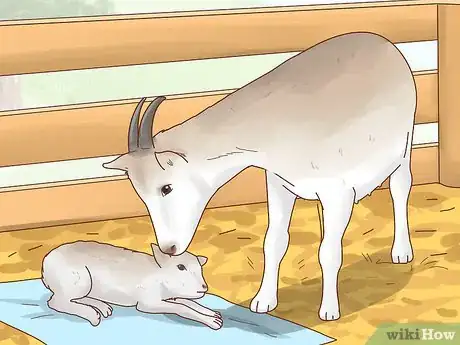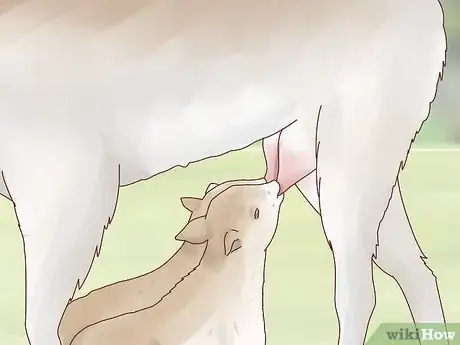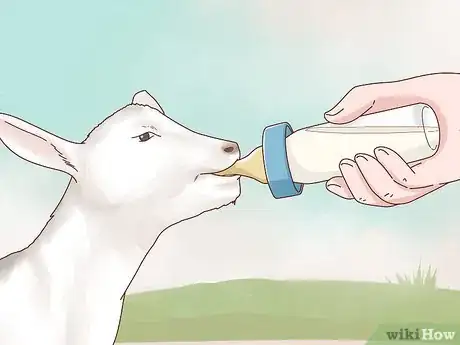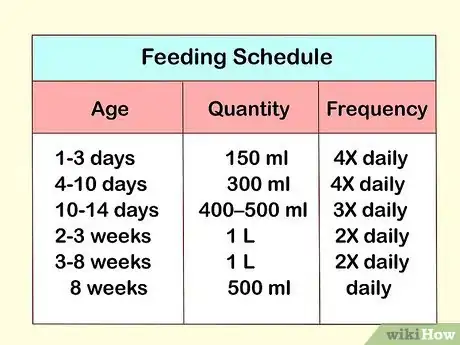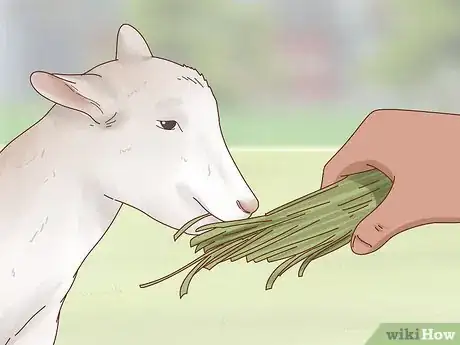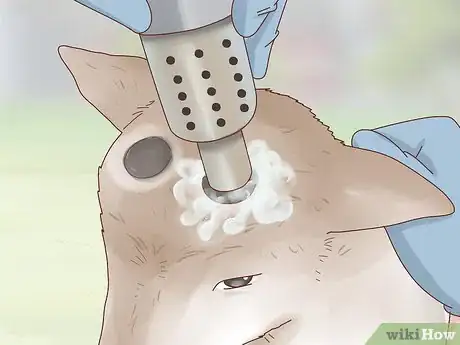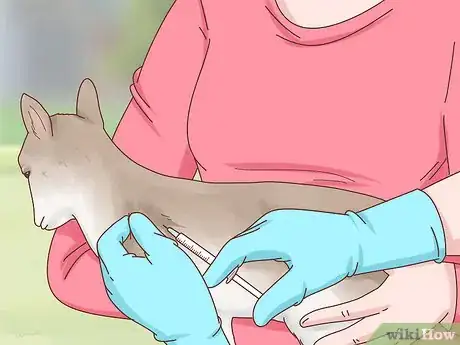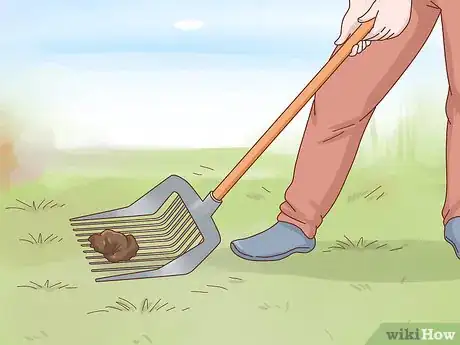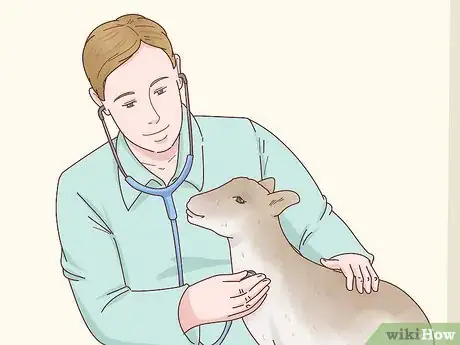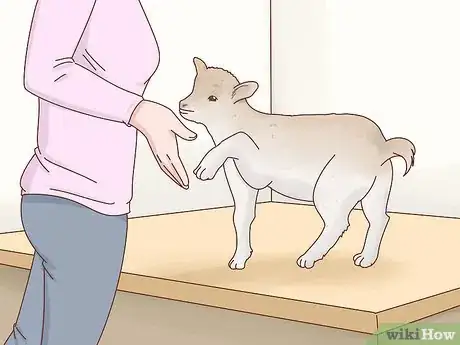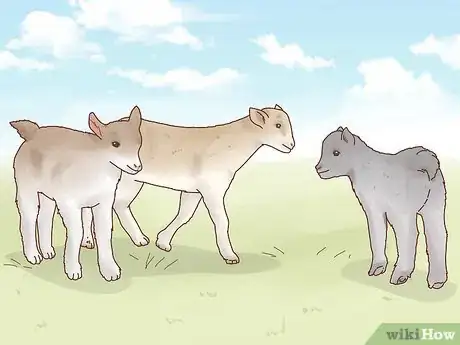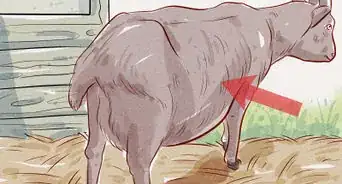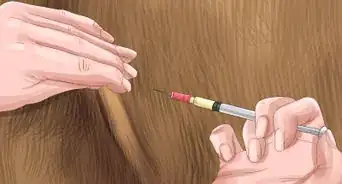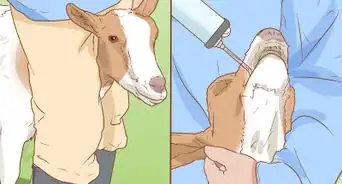This article was co-authored by Ryan Corrigan, LVT, VTS-EVN. Ryan Corrigan is a Licensed Veterinary Technician in California. She received her Bachelor of Science in Veterinary Technology from Purdue University in 2010. She is also a Member of the Academy of Equine Veterinary Nursing Technicians since 2011.
wikiHow marks an article as reader-approved once it receives enough positive feedback. This article received 29 testimonials and 93% of readers who voted found it helpful, earning it our reader-approved status.
This article has been viewed 405,442 times.
Having baby goats, or kids, can be an exciting time. As fun as they may be, they still require excellent care to help them grow up. Try following some of the best general practices to keep your new kids happy and healthy.
Steps
Caring For Newborn Kids
-
1Give them a warm and dry space. Part of keeping your baby goat happy and healthy will involve giving them a proper space to live in. Baby goats need a space that is both warm and dry, as either cold or dampness can have an ill effect on their health.
- Make sure there is plenty of warm bedding. Pine chips, wheat straw and hay can all be used for warm bedding.
- Change any bedding that becomes wet.
- If the area is cold, consider adding a heat lamp. Make sure the heat lamp is absolutely secure, as it is a fire hazard. Keep the lamp at least 3 ft (0.91 m) above the kids, and make sure they can go to a cooler area if they get too warm.
-
2Clean the navel cord. The umbilical cord should naturally break away from both the newborn and the mother. However, freshly broken navel cords can become infected and may need additional attention.
- Never cut the cord between the mother and newborn. Allow this to break naturally. Only attempt trimming the cord if it is longer than four inches after it breaks.
- If you are unsure of what to do, make sure your veterinarian is on site during the birthing process.
- If the cord is still quite long, you should trim it closer to the kids stomach.
- Trim to about three to four inches in length.
- Always used sterilized instruments. Make sure whatever instrument, such as a pair of scissors, are sharp enough to make the cut.
- Dip the cord in iodine, betadine, or diluted chlorhexidine. This kills bacteria and prevents infection. It also helps the cord dry much faster.
- The cord should fall away from the newborn within three weeks.
Advertisement -
3Leave the baby goat with the mother. After you help the mother trim the umbilical cord, leave her baby goat with her. The mother will want to lick the baby clean.[1]
- Allowing the mother to clean the baby will increase the bond between them.
- Creating a bond between the mother and newborn is extremely important.
- Stay with both the mother and the newborn goat. Help keep the birthing area clean and monitor the baby goat.
- A few moments after the baby goat, or goats have come out, the afterbirth will follow. Allow the mother to eat the amount of this she will before disposing of it.
-
4Let your baby goats get milk from their mother. The first feeding, or colostrum, is extremely important. The mother's milk contains important antibodies that the kid will need to survive.
- The kid should feed for the first time within an hour.
- Baby goats should feed four or five times a day
- Pull a few streams of milk from the doe to make sure the milk isn't blocked.
- Watch the baby kid to make sure it drinks milk. If the kid is having trouble finding where to feed from, give it some direction.
- If the kid isn't drinking from the mother, bottle feed it the colostrum. The milk needn't be from the mother, it can be from another goat producing milk.
- You can also find colostrum in stores. It will require refrigeration.
Feeding with a Bottle
-
1Decide if you will bottle feed the kids by hand. You may elect to bottle feed your goat, instead of letting them get milk from the mother. This can result in a more tame and friendly adult goat, once your kid grows up.[2]
- If allowing the mother to feed them, monitor the kids and make sure the kid is getting milk without trouble. Sometimes the mother won't want to feed her kids and you might have to bottle feed.
- If you choose to let the mother feed the kids, try to spend time with both the mother and the new kids. This will help them grow up to be comfortable and calm around people.
- Whatever you choose, the kid will need milk for at least eight weeks.
- Always sterilize bottles and any other feeding equipment.
- If bottle feeding, you can get milk from the mother, another goat producing milk, or purchase it from a farm supply store.
- Dramatic changes in their lifestyle or diet can affect their mood and the solidness of their stool. If the vet tells you to give them a special powder with their milk ( if you are bottle feeding them) then don't give it to them in one big dose; maybe give it to them in halves for a period of 2 days, see how they like it and then give the full amount to them.
-
2Learn the feeding schedules for your kids. Keeping a good feeding schedule will allow your kids to get the right amount of food and nutrition. Follow a schedule similar to this one to help ensure you baby goats are getting fed properly:
- At one to three days old, 150 milliliters (5.1 fl oz) of milk four times daily.
- At four to ten days old, 300 milliliters (10.1 fl oz) of milk four times daily.
- At ten to fourteen days old, 400–500 milliliters (13.5–16.9 fl oz) of milk three times daily. Add clean hay to diet.
- At two to three weeks old, increase morning and evening milk to 1l, reduce midday milk to 0. Add pasture and 100g of bran to diet.
- At three to eight weeks old, 1l of milk twice daily.
- At eight weeks or 18kg in weight, 500 milliliters (16.9 fl oz) of milk a day before weaning.
-
3Wean your goat from milk. At some point, your baby goat won't need to drink milk, either from a bottle or from its mother. Help it to get to this stage by slowly introducing solid foods, such as hay or pasture feed, while reducing the amount of milk being offered.
- Offer hay, grain, time in the pasture, and fresh water to allow your baby goat to start eating these foods instead of milk.
- Most healthy goats can start to be weaned at about thirty days old.
- A goat can start to be weaned at about twenty-five to thirty pounds or double its birth weight.
- You may start to offer grain at about one week of age to help the goat start rumen development.
Administering Further Care
-
1Remove your kid's horn buds. Horns are a great fit for wild goats who need them to defend themselves. However, in a domesticated setting, horns can be a danger. The goats could hurt each other or get their horns stuck around the pen. Removing horns helps keep both you and your goats safer.[3] [4]
- If you are unsure of how to dis-bud your baby goats, please contact a veterinarian. Improper removal of horn buds can cause serious harm.
- Remove horn buds at around one week old. Removing horns only becomes more difficult with an older goat.
- Usually, a disbudding iron will be used to dis-bud your baby goat. This iron will be heated to a high temperature and will be used to burn the horn buds into inactivity.
-
2Vaccinate your kids. While it's true that some immunities will be inherited from the mother's milk, there will be some diseases that your goat won't be immune to. Vaccinations will prevent common diseases in your kids.[5]
- At around 30 days of age, administer Clostridium and tetanus vaccinations.
- Clostridium will help prevent overeating disease types C and D.
- Administer a CD&T booster shot 3-4 weeks later. While you can administer vaccinations by yourself, it's best to learn from your veterinarian or have them perform the vaccination for you.
-
3Keep a clean pasture. If you mix your baby goats in a pasture with other adult goats, make sure the pasture is kept clean. Your baby goats will begin to eat various plants they find out in the pasture. However, if there is too much manure they may quickly fall ill.[6]
- Consuming food from a pasture full of manure can give your baby goats worms and other parasites.
- Keep the pasture as free of manure and waste as you can.
- You may want to keep young goats in a separate pasture.
-
4Keep up with regular medical needs. Your kids, especially when very young, will need regular medical evaluation and procedures. Watch over your baby goats and give them routine care as they grow up.
- Schedule regular check-ups with your veterinarian.
- Goats and kids should be checked for parasites quite often. Your vet will test fecal samples to determine how they should deworm your goat.
- De-worm your goats twice a year--once in spring and once in late summer.
- Check your goat's temperature with a rectal thermometer. Normal temperatures should be around 101 to 102 degrees Fahrenheit.
- Watch for lice. Lice are small insects that will infest your goat's fur. You can purchase lice powder at most farm stores and keep your goat's fur trimmed short to help stop lice.
-
5Train your baby goats early. If you are training them, the earlier the better! If you train them at a young age, they will be more alert than if you train them when they are older.
Helping Your Kids Grow Up Healthy
-
1Provide shelter and bedding. Even as your goats grow up, they will still need proper shelter and bedding. The shelter will need to block wind, provide warmth, and keep any rain or snow off of your goats. Any bedding offered will need to be kept clean and dry.[7]
- Make sure there are no drafts in the shelter.
- If in a warm and dry climate, you will need at least a three-walled shelter.
- In colder or wet climates, you will have to make sure that the shelter is enclosed.
- A goat needs around ten square feet of space in the shelter, if it is also allowed access to pasture.
- Dirt floors can help absorb urine from your goats. Cover with hay to provide a comfortable and warm bed. You can also use wood shavings for bedding.
-
2Feed your baby goat new foods. Until a month or two your baby goat will drink mostly milk and water. During and after the weaning process, your goat will want to eat some other foods.
- Offer the following food items to your baby goat as it grows:
- Grain.
- Hay (alfalfa).
- Grass (pasture feeding).
- Corn.
- Oats.
- Barely.
- Avoid having certain poisonous plants near your goats:
- Azaleas.
- Rhododendrons.
- Moldy grains.
- Offer the following food items to your baby goat as it grows:
-
3Socialize your kids. If you want a friendly and loyal goat, who is comfortable around people, it is important that the kid imprint on you. Getting the baby goat to imprint on you is as easy as spending time with them.
- The first few moments of life are critical. As they are born, be there with the kids. Spend time with the kids and the mother and let the kids get to know you both.
- During the first two days of the baby goat's life, you will want to spend as much time as possible with them. The more time you spend, the deeper the imprint will be.
- Allow your baby goats to socialize with other goats. By allowing them to spend time with the rest of the herd, after imprinting, they will view you as another member of the herd.
- Don't allow your baby goats to be near other adult goats with any illness. Kids immune systems are not as strong as an adult goats, any exposure to disease can easily affect them.
Expert Q&A
Did you know you can get expert answers for this article?
Unlock expert answers by supporting wikiHow
-
QuestionCan newborns be around Billy goats?
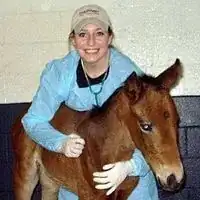 Ryan Corrigan, LVT, VTS-EVNRyan Corrigan is a Licensed Veterinary Technician in California. She received her Bachelor of Science in Veterinary Technology from Purdue University in 2010. She is also a Member of the Academy of Equine Veterinary Nursing Technicians since 2011.
Ryan Corrigan, LVT, VTS-EVNRyan Corrigan is a Licensed Veterinary Technician in California. She received her Bachelor of Science in Veterinary Technology from Purdue University in 2010. She is also a Member of the Academy of Equine Veterinary Nursing Technicians since 2011.
Licensed Veterinary Technician
-
QuestionHow long should we keep our baby Pygmy goat and their mom away from the dad goat?
 Ryan Corrigan, LVT, VTS-EVNRyan Corrigan is a Licensed Veterinary Technician in California. She received her Bachelor of Science in Veterinary Technology from Purdue University in 2010. She is also a Member of the Academy of Equine Veterinary Nursing Technicians since 2011.
Ryan Corrigan, LVT, VTS-EVNRyan Corrigan is a Licensed Veterinary Technician in California. She received her Bachelor of Science in Veterinary Technology from Purdue University in 2010. She is also a Member of the Academy of Equine Veterinary Nursing Technicians since 2011.
Licensed Veterinary Technician
-
QuestionHow is a goat born?
 Ryan Corrigan, LVT, VTS-EVNRyan Corrigan is a Licensed Veterinary Technician in California. She received her Bachelor of Science in Veterinary Technology from Purdue University in 2010. She is also a Member of the Academy of Equine Veterinary Nursing Technicians since 2011.
Ryan Corrigan, LVT, VTS-EVNRyan Corrigan is a Licensed Veterinary Technician in California. She received her Bachelor of Science in Veterinary Technology from Purdue University in 2010. She is also a Member of the Academy of Equine Veterinary Nursing Technicians since 2011.
Licensed Veterinary Technician
Warnings
- Do not attempt to de-horn, vaccinate, or any other medical procedure if you have no experience doing so. Always contact a veterinarian if you need help.⧼thumbs_response⧽
Things You'll Need
- Warm and dry shelter/environment.
- Sharp clean instrument to cut the umbilical cord.
- Iodine to sterile the umbilical cord.
- Grains, hay, and plenty of fresh water.
- Bottles and milk if hand feeding.
- Your veterinarian's phone number.
References
- ↑ http://www.backwoodshome.com/articles2/clay112.html
- ↑ http://www.backwoodshome.com/articles2/clay112.html
- ↑ http://extension.psu.edu/courses/meat-goat/reproduction/breeding-and-kidding-management/newborn-kid-care
- ↑ http://www.backwoodshome.com/articles2/clay112.html
- ↑ http://extension.psu.edu/courses/meat-goat/reproduction/breeding-and-kidding-management/newborn-kid-care
- ↑ http://www.backwoodshome.com/articles2/clay112.html
- ↑ http://animals.mom.me/kind-shelters-goats-need-4732.html
About This Article
To care for baby goats, make sure they're getting milk for the first 8 weeks after they're born. If the goats aren't getting milk from their mother, you can bottle feed them instead. Once the goats are 30 days old, start to wean them off of milk by slowly introducing hay, grain, and water into their diet. On top of feeding them a healthy diet, spend as much time as possible with the goats after they're born so they grow up to be comfortable around you. For tips on providing shelter and bedding for baby goats, keep reading!
